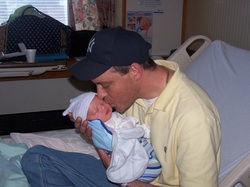Collecting samples for Court Admissible DNA/Paternity analysis is an easy and painless experience which can be performed at EMSI-New England DNA Inc. in Rocky Hill, Connecticut. A sterile swab is rubbed on the inside of the cheek for 30 seconds, placed into an envelope and sent back to the lab for analysis. Please contact New England DNA for a personalized confidential consultation. Lab Analysis offered through AABB Accredited Chromosomal Labs.
Services offered include
Court Admissible Paternity Testing (In office only)

Establishing paternity is important for both the child and the parents. A child is entitled to the sense of belonging and identity that comes from knowing both parents.
Establishing paternity often has an important emotional and psychological benefit for the child. Until there is a determination that a biological father is the legal father, the child has no right to receive financial support from the father, to inherit from the father, or obtain insurance, veterans’ social security or other benefits through the father.
Likewise, until paternity is legally established, the biological father has no legal rights to the child, such as parenting time with the child, or participation in major decisions about the child, such as medical treatment, education or religious training. Additionally, genetic diseases are inherited, thus knowing your biological ancestry can be useful in proactive care and transplantation.
Paternity laws tend to vary from state to state. Chromosomal Laboratories routinely uses a 16 marker test that can achieve a probability of > 99.999%. Should a complex case arise, Chromosomal Laboratories can test an additional 5 markers, for a total of 21 genetic markers.
Maternity Testing

DNA testing can be used to confirm the biological relationship between a mother and child. The testing follows the same principles as in paternity testing. This test is often useful in cases were a child has been separated by adoption or there is a concern that the baby was switched at birth. The fee for this test includes the mother and a single child.
Grand Parent Testing

In circumstances where an alleged father is unwilling or unavailable for paternity testing, the alleged father’s parents can be tested to determine whether they are the true biological grandparents of the child.
The most accurate results are obtained when both grandparents are tested. If both grandparents are not available, the test can be performed using only one grandparent; however the results will not be as conclusive.
The results of a grand parentage test are not as strong as those from a conventional paternity test and as a result, should be performed only if it is impossible to conduct a paternity test.
The most accurate results are obtained when both grandparents are tested. If both grandparents are not available, the test can be performed using only one grandparent; however the results will not be as conclusive.
The results of a grand parentage test are not as strong as those from a conventional paternity test and as a result, should be performed only if it is impossible to conduct a paternity test.
Avuncular Testing

An avuncular test involves testing the child’s paternal aunt or uncle (the alleged father’s sister or brother). Including the mother in this test is strongly recommended as it strengthens the genetic evidence.
Generally, this test will not give results as strong as a grandparentage test, but it is still a good option if the only people available for testing are the alleged father's siblings. The fee for this test is based on the number of individuals tested. Results are available 3-5 business days after receipt at the laboratory.
Generally, this test will not give results as strong as a grandparentage test, but it is still a good option if the only people available for testing are the alleged father's siblings. The fee for this test is based on the number of individuals tested. Results are available 3-5 business days after receipt at the laboratory.
Sibling Testing

A siblingship test determines if two or more individuals have common parents. Full siblings share both parents while half-siblings share one parent. DNA samples from both alleged siblings are necessary. Testing of the parents also increases the accuracy of the test. Unlike paternity testing which provides very conclusive results, the results of siblingship testing are not always conclusive, and are dependent on the genetics of the individuals being tested.
Generally, a siblingship test will not provide a conclusive answer; however, it will likely provide an indication of whether you are more likely to be or not to be the true biological sibling of the other tested individual. The fee for this test is based on the number of individuals tested.
Generally, a siblingship test will not provide a conclusive answer; however, it will likely provide an indication of whether you are more likely to be or not to be the true biological sibling of the other tested individual. The fee for this test is based on the number of individuals tested.
